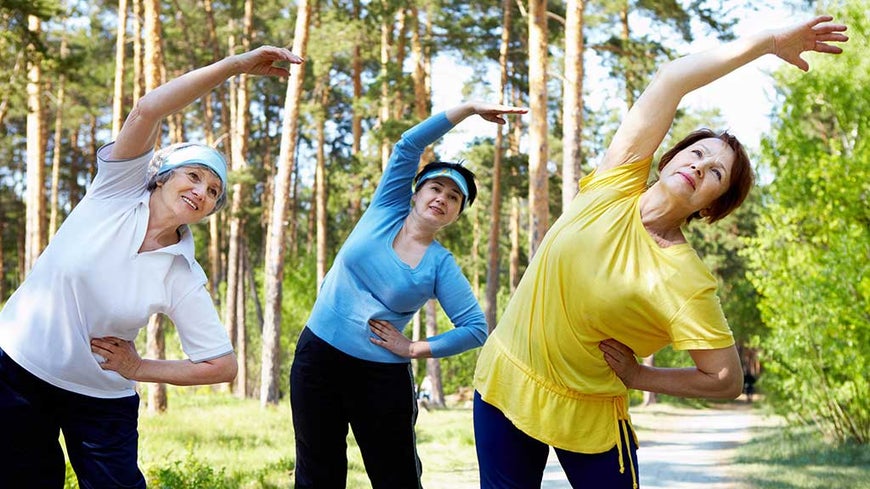How to achieve healthy ageing

Good health not only helps you to enjoy a good quality of life, but also helps to reduce your demands for health and aged care services as you get older. For this reason, improving the health of the ageing population is a national priority in Australia. And one area of special interest is the adoption of a healthy lifestyle, which helps to prevent disease and functional decline, as well as promote a longer, happier, more active life.
Studies in this area show that today’s Australians are generally healthier than previous generations, but there’s always room for improvement. For example, only 2 in 5 older people reported being sufficiently active during the preceding week.
Benefits of healthy ageing
Aches and pains are typical in older adults, and it stands to reason that as we age, our bodies feel more twinges. It also makes sense that our weight increases as we become less active. The good news is, there’s plenty we can do about these age-related ailments.
By starting your day with a healthy attitude, by exercising, eating well, maintaining strong relationships and pursuing education, you can effectively help prevent common issues associated with ageing.
This includes issues such as:
- Increased weight
- Fatigue
- Reduced muscle mass
- Reduced coordination and balance
- Cardiovascular and respiratory problems
- Reduced bone strength
- Increased blood pressure
- Mood swings
- Anxiety and depression
- Increased risk of disease
Healthy ageing allows you to maintain:
- Brain function
- Active lifestyle
- Social relationships
- Healthy weight
- General wellbeing
How to age healthily
Healthy ageing is a combination of activities and behaviours specifically done to benefit your overall health. These include:
Physical exercise
The human body responds to exercise no matter how old it is, meaning it’s never too late to get fit. But many older people believe that exercise is no longer appropriate.
The reality is, exercise has never been more appropriate than for people of this age group. About half of all declines associated with ageing are the result of a lack in physical activity, and no other activity will benefit you more than exercise. As a guide, you should aim to get 30 minutes of exercise every day, which will not only keep your body active, but will deliver an oxygen boost to the brain to keep the brain in optimal health.
The best way to achieve the recommended exercise time is to look for activities you find interesting. Ideas include walking, swimming, cycling and weight training also offers a huge range of benefits. Not only can weight training help counteract age-related muscle loss, but weight-bearing exercise is also one of the most effective remedies against osteoporosis. If exercise is something you don’t particularly enjoy, try performing it in three 10-minute blocks.
Diet
Good nutrition helps to keep your body and brain in optimal condition, increasing mental acuteness and resistance to illness and disease. It offers higher energy levels, faster recuperation times and assists with better management of chronic health problems.
Your diet should consist of a variety of colourful fruits and vegetables, as well as whole grains and lean protein. Protein is essential for proper muscle growth and maintenance.
National Health & Medical Research Council recommends1:
- 2–3 servings of whole fruits per day.
- 2–3 cups veggies per day. Choose antioxidant-rich dark, leafy greens such as kale, spinach and broccoli, as well as orange vegetables such as carrots and pumpkin.
- 1,200mg calcium (milk, yoghurt, cheese, tofu, almonds) per day.
- 170–200g whole grains (pasta, breads, cereals) per day.
- Around 75g high-quality protein per day. Choose a variety of protein sources, including red meat, chicken, turkey, fish, beans, peas, eggs, nuts, seeds, cheese.
- 3 meals and 2 snacks per day.
Mental stimulation
Researchers at Stanford University found that memory can be improved by 30–50% simply by doing mental exercises.2
Try:
- Cultivating a new hobby.
- Playing ‘thinking’ games like Chess, Scrabble and Trivial Pursuit.
- Reading newspapers, magazines and books.
- Doing crossword puzzles and brain teasers.
- Watching ‘question and answer’ game shows.
- Meditation.
- Learning a new language.
Sleep
For older adults, a good night’s sleep is especially important because it helps improve concentration and memory formation, allows your body to repair any cell damage that occurred during the day, and refreshes your immune system.
Insufficient sleep could increase risk4 of:
- Cardiovascular disease.
- Diabetes.
- Weight problems.
- Breast cancer in women.
Older adults should aim to get seven and a half to nine hours sleep per night.
We all want security in our retirement years, and they say change is as good as a holiday, so if you’re looking for other options for your health insurance, make the switch to Seniors Health Insurance today.
10 Feb 2016